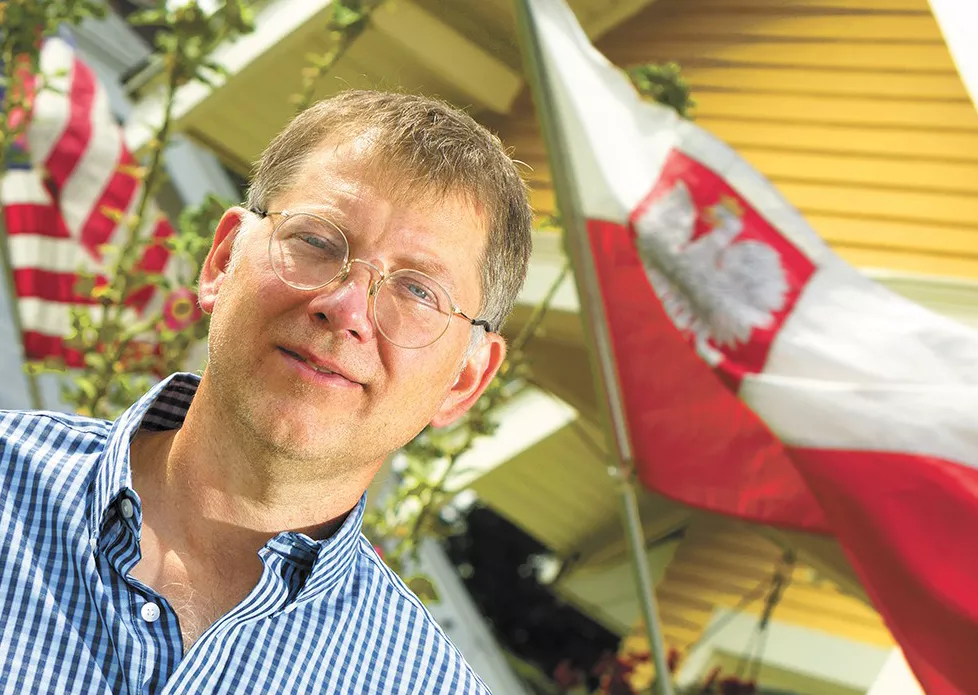When Robert Sloma moved into his new home, he hung two flags outside his house — American and Polish — as one of his first orders of business. Through this simple act, he unwittingly laid the foundation from which the community he'd been searching for would emerge.
Sloma had always been used to hearing Polish spoken in public places, even in areas without a significant Polish population. But after he and his family relocated to Spokane in 2004, Sloma met only one other person who spoke Polish in his first two years here.
Sloma grew up in a Syracuse, New York, neighborhood that was vibrant with Polish culture. The Polish Roman Catholic Church, which also operated a parochial school, and the Polish community home were the central neighborhood hubs.
Sloma grew up reciting "The Polish Child's Creed," a nationalistic poem that his parents had taught him. "Who are you? A little Pole. What's your sign? The white eagle. Where do you live? Among my own people," the poem began. Ingrained in him as it was, the connection to his Polish heritage is a cornerstone in his life, and he wanted to make sure that his son was also raised with immersion in the Polish community.
However, it wasn't until the day he hung the Polish flag outside his house that Sloma began to find such a community in Spokane.
"Later that day, someone came by in a broken accent and asked what kind of flag that was, and obviously he knew what it was because he was Polish," says Sloma.
The man, Andy Kolodrub, had come to Spokane after the fall of the Berlin Wall. Through him, Sloma met other Spokanites with Polish ancestry and created an Excel document with the contact information of the Poles he met. In 2006, Sloma's wife, Kathy Callum, created a Facebook page called Spokolonia, a portmanteau of Spokane and Polonia, the word used for the Polish diaspora — Poles living outside the country's borders.
Statistics from a 2000 survey conducted by Steven Neufield, Ph.D, through the department of sociology at Eastern Washington University indicate that at that time, a mere 1.7 percent of the Spokane County population identified as having Polish ancestry. The archives of the Spokane Daily Chronicle cite Poles relocating to Spokane as early as the beginning of the 1900s; a number of Polish refugees arrived in Spokane in the mid-'80s; and according to Sloma, Kolodrub was part of another wave of Poles who settled in Spokane after the fall of the Berlin Wall. Still, a strong Polish community was never established. Sloma and the community he's built through Spokolonia are attempting to change this.
Kasia Haroldsen, who grew up in Sopot, Poland, now lives in Spokane Valley and is one of the administrators of the Spokolonia Facebook page. She met Sloma when she was performing Polish songs at the Spokane Folk Festival several years ago.
"There is a point in your life when you wish you would know stories of your grandma or grandpa... We are all so different, everybody, right? You know, they're not from my mom and my dad," she says. "We all grow and things fade away, and they're not kept alive. If you don't keep [them] alive, it's dead, it's gone."
Through the six or seven families at the core of Spokolonia, the pulse of Spokane's Polish community is continuing to beat. From hosting the Polish folk ensemble, Jedliniok, to organizing potlucks, to researching local Polish history in their spare time and sharing Polish history and traditions on their Facebook page, Spokolonia is enthusiastic about celebrating their heritage and eager to welcome anyone with an interest in Polish culture.
In February, Sloma partnered with New Leaf Bakery Café to make paczki, a Polish pastry, traditionally eaten before Lent. The bakery made the pastry and Sloma contributed the jam fillings. In cities like New York and Chicago, paczki can be found even in major grocery stores. In Spokane, Poles ordered the pastry from Sloma and picked them up from his house. This was the first year he collaborated with the nonprofit job training program, and his goal is to eventually "have the best paczki that you can find west of Chicago and east of Seattle."
"It's a unique thing for groups and individuals to be able to maintain a small nucleus of a community that reminds them of home, of where they came from," says Sloma. ♦

